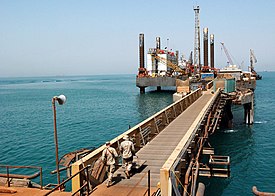Economy of Iraq

|
|
| Currency | Iraqi dinar (IQD) |
|---|---|
|
Trade organisations
|
OPEC |
| Statistics | |
| GDP | $223.5 billion (2014 est.) |
|
GDP growth
|
-2.1% (2014 est.) |
|
GDP per capita
|
$7,100 (2013 est.) |
|
GDP by sector
|
agriculture: 3.4% industry: 64.9% services: 31.7% (2012 est.) |
| 2% (2013 est.) | |
|
Population below poverty line
|
25% (2008 est.) |
|
Labour force
|
8.9 million (2010 est.) |
|
Labour force by occupation
|
agriculture: 21.6%; industry: 18.7%; services: 59.8% (2008 est.) |
| Unemployment | 25% (2012 est.) |
|
Main industries
|
petroleum, chemicals, textiles, leather, construction materials, food processing, fertilizer, metal fabrication/processing |
| 165th (2017) | |
| External | |
| Exports | $83.98 billion (2014 est.) |
|
Export goods
|
crude oil 84%, crude materials excluding fuels 8%, food and live animals 5% |
|
Main export partners
|
|
| Imports | $45.2 billion (2014 est.) |
|
Import goods
|
food, medicine, manufactures |
|
Main import partners
|
|
|
Gross external debt
|
$58.13 billion (31 December 2014 est.) |
| Public finances | |
| Revenues | $69.2 billion (2011 est.) |
| Expenses | $82.6 billion (2011 est.) |
|
Foreign reserves
|
$66.85 billion (31 December 2014 est.) |
Iraq's economy is dominated by the oil sector, which has provided about 95% of foreign exchange earnings in modern times. In the 1980s, financial problems caused by massive expenditures in the eight-year war with Iran and damage to oil export facilities by Iran led the government to implement austerity measures, borrow heavily, and later reschedule foreign debt payments; Iraq suffered economic losses of at least $80 billion from the war. After the end of hostilities, in 1988, oil exports gradually increased with the construction of new pipelines and restoration of damaged facilities.
Since mid-2009, oil export earnings have returned to levels seen before Operation New Dawn and government revenues have rebounded, along with global oil prices. In 2011 Baghdad probably will increase oil exports above the current level of 1,900,000 bbl (300,000 m3) per day as a result of new contracts with international oil companies, but is likely to fall short of the 2,400,000 barrels (380,000 m3) per day it is forecasting in its budget. Iraq's recent contracts with major oil companies have the potential to greatly expand oil revenues, but Iraq will need to upgrade its oil processing, pipeline, and export infrastructure to enable these deals to reach their potential.
An improved security environment and an initial wave of foreign investment are helping to spur economic activity, particularly in the energy, construction, and retail sectors. Broader economic improvement, long-term fiscal health, and sustained increases in the standard of living still depend on the government passing major policy reforms and on continued development of Iraq's massive oil reserves. Although foreign investors viewed Iraq with increasing interest in 2010, most are still hampered by difficulties in acquiring land for projects and by other regulatory impediments.
Inflation has decreased consistently since 2006 as the security situation has improved. However, Iraqi leaders remain hard pressed to translate macroeconomic gains into improved lives for ordinary Iraqis. Unemployment remains a problem throughout the country. Reducing corruption and implementing reforms - such as bank restructuring and developing the private sector - would be important steps in this direction.
Nominal GDP grew by 213% in the 1960s, 1325% in the 1970s, 2% in the 1980s, -47% in the 1990s, and 317% in 2000s.
Real GDP per capita (measured in 1990 $) increased significantly during the 1950s, 60s and 70s, which can be explained by both higher oil production levels as well as oil prices, which famously peaked in the 1970s due to the OPEC’s oil embargo. In following two decades however, GDP per capita in Iraq dropped substantially because of multiple wars, namely the 1980-88 war with Iran, the 1990-1991 Gulf War.
...
Wikipedia
